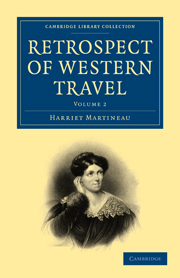Summary
“O! das Leben, Vater,
Hat Reize, die wir nie gekannt.—Wir haben
Des schönen Lebens öde Küste nur
Wie ein umirrend Räubervolk befahren.
Was in den innern Thälern Köstliches
Das land verbirgt, O! davon—davon ist
Auf unsrer wilden Fahrt uns nichts erschienen.”
Schiller.“We ask
But to put forth our strength, our human strength,
All starting fairly, all equipped alike,
Gifted alike, and eagle-eyed, true-hearted.”
Paracelsus.The traveller in America hears, on every hand, of the fondness of slaves for slavery. If he points to the little picture of a runaway prefixed to advertisements of fugitives, and repeated down whole columns of the first newspaper that comes to hand, he is met with anecdotes of slaves who have been offered their freedom, and prefer remaining in bondage. Both aspects of the question are true; and yet more may be said on both sides. The traveller finds, as he proceeds, that suicides are very frequent among slaves; and that there is a race of Africans who will not endure bondage at all, and who, when smuggled from Africa into Louisiana, are avoided in the market by purchasers, though they have great bodily strength and comeliness. When one of this race is accidentally purchased and taken home, he is generally missed, before twenty-four hours are over, and found hanging behind a door, or drowned in the nearest pond. The Cuba slave-holders have volumes of stories to tell of this race, proving their incapacity for slavery.
- Type
- Chapter
- Information
- Retrospect of Western Travel , pp. 97 - 119Publisher: Cambridge University PressPrint publication year: 2010First published in: 1838

